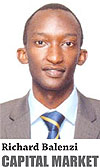Currently, the securities trading on the Rwanda Capital Market are; KCB’s shares, BCR bonds and Government of Rwanda Treasury bonds. More products are likely to be offered before the end of this year with the slated BRALIRWA Initial Public Offer and cross-listing of Nation Media Group, Equity Bank, TPS Serena and Kenokobil.


Currently, the securities trading on the Rwanda Capital Market are; KCB’s shares, BCR bonds and Government of Rwanda Treasury bonds.
More products are likely to be offered before the end of this year with the slated BRALIRWA Initial Public Offer and cross-listing of Nation Media Group, Equity Bank, TPS Serena and Kenokobil.
In case you are thinking of investing in the Capital Market, it is useful to know the difference between shares and bonds. While both are types of investments which can earn you money, they are differ greatly in terms of the potential risks and rewards.
A share is a unit of ownership in a company. When you buy a share in a company, you become a part-owner of the company in proportion to your shareholding. For instance, consider the hypothetical example of Virunga Mines Ltd.
If it were a publicly traded company on the Rwandan Capital market with 1 million shares and you bought 2000 of them, you would own 0.2 percent of it. As a result, you would participate in the affairs of the company through your voting rights at its Shareholder General meetings.
Additionally, you would be entitled to some income (called dividends) when Virunga
Mines Ltd declares profits. However, in case it makes no profits then you will not receive any returns on your investments.
A bond on the other hand does not represent ownership in a company. If the hypothetical Virunga Mines Ltd wants to raise capital in order to expand its operations, but it does not want to either divide its ownership further by selling shares, or borrow money from a bank, it may opt to sell bonds to the public.
A bond is a certificate issued by a borrower e.g a Company or Government as evidence that the borrower owes the bond holder (creditor) a specified sum of money. Instead of earning dividends as in the case of shares, the bond holder earns interest on the debt at regular intervals e.g once every six months and the principal at a later date (known as the maturity date).
Generally, bonds are considered as safer and more predictable investments than shares. This is due to the fact that unlike a share holder who only enjoy dividends only when the Company makes profits, a bond holder is usually assured of obtaining interest payments (normally between 7% -15%) at periodic intervals.
Bonds also offer higher returns to an investor than savings accounts since interests rates offered on bonds are typically higher than those offered by banks to their clients who have savings accounts.
Conversely, shares are more risky but offer the possibility of greater rewards for investors (shareholders) in case the company makes big profits.
It is also important to note that in case a company goes into liquidation or becomes bankrupt, its bond holders rank higher (have a higher claim in the company’s assets) than its share holders and are thus paid first. This is because the bond holders are the Company’s creditors.
Also, as opposed to shares, bonds have a defined term (maturity) after which the bond is redeemed (ie the debt owed by the Company is paid off). Shares on the other hand may be outstanding indefinitely.
As investments, one of the reasons why shares and bonds are attractive is the fact that they are easily convertible into cash than most other forms of assets.
The choice of whether to invest in shares or bonds or both normally depends on your appetite for risk. Would you rather buy shares worth 100,000 RWF in a company in the hope of that the company will reap huge profits and give you huge dividends after a few years than lend somebody 100,000 RWF and know that you will get 120,000RWF back in 5 years? If you are a long term investor, it is advisable to have a little bit of both in your portfolio.
It is always wise to seek professional advice from your stock broker before investing in the capital market.
Richard Balenzi is a lawyer by profession.


